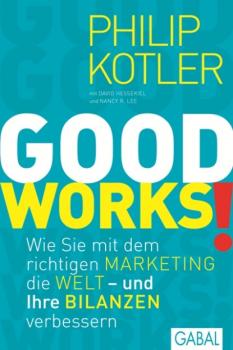Philip Kotler
Список книг автора Philip KotlerMarketing 5.0
En Marketing 5.0. Tecnología para la humanidad se identifica la creciente tendencia a alinear la tecnología con las capacidades humanas para lograr resultados exponenciales en el momento de aplicar las estrategias de marketing. Entre los temas fundamentales del marketing 5.0 está lo que se conoce como next tech, un grupo de tecnologías que se pueden ver materializadas en la inteligencia artificial (IA), el procesamiento del lenguaje natural (PLN), la tecnología de sensores, el internet de las cosas (IoT), la realidad aumentada (RA), la realidad virtual (RV) y el blockchain. Esta edición contiene los casos de éxito de nueve empresas que operan en nuestro país: Comex, Crayola, Grupo Modelo, INTERprotección, KFC, Mary Kay, Museo del Caos, Sam´s Club y Volkswagen.
Marketing 4.0 (versión México)
Las nuevas tecnologías, las redes sociales y el marketing digital en general están revolucionando la forma de llegar a nuestros clientes. El cliente de hoy tiene unos hábitos diferentes al de hace unos años: está hiperinformado, hiperconectado, ama las empresas honestas y éticas, no compra sin antes comparar, confía en las experiencias de otros consumidores y es infiel a las marcas. Por eso, ahora más que nunca, es necesario reorientar nuestras prácticas de marketing para ganar el apoyo y confianza del cliente. Si conseguimos superar sus expectativas no solo nos comprará, sino que nos recomendará. Para ello es necesario ofrecer experiencias transparentes y coherentes, y cubrir cada aspecto del producto que este demande: marcas más humanas, mayor compromiso, ofertas mejores y más personalizadas. Es el marketing 4.0. Para lograr ese compromiso del cliente y su recomendación, los autores de Marketing 4.0 nos proponen combinar lo mejor de ambos mundos, el marketing tradicional y el marketing digital. Nos indican cómo poner en marcha estrategias 360º complementándolas con inteligencia artificial para mejorar la productividad del marketing, o el big data para adaptarnos mejor a las necesidades del cliente.
GOOD WORKS!
Unternehmen, die sich heute gesellschaftliche Verantwortung (CSR) auf die Fahnen schreiben, haben folgendes Problem: Entweder man wirft ihnen vor, CSR opportunistisch als Marketinginstrument zu missbrauchen, oder sie gelten als sozialromantische Übergangsphänomene ohne ernsthafte wirtschaftliche Ambition. Good Works! wendet sich an Unternehmenslenker, die aus tiefer Überzeugung beides wollen: Gewinne erzielen und Gutes tun.
Das Buch enthält zahlreiche praktische Impulse, wie gesellschaftliche und wirtschaftliche Ziele ausbalanciert werden können. CSR ist längst kein Nice-to-have mehr. Es ist ein Must-do für alle Wirtschaftsvertreter, die auch in Zukunft ernst genommen werden, und gehört zum Spannendsten, was die Unternehmenswelt uns heute zu bieten hat.
Immer mehr Unternehmen beweisen tagtäglich, dass es möglich ist, gleichzeitig etwas für eine bessere Welt und für die eigenen Bilanzen zu tun. Good Works! zeigt anhand aktueller Beispiele aus über 50 großer und mittelständischer Unternehmen weltweit – darunter Coca Cola, Nike, Patagonia, IBM, Genreral Electric u.a. – wie Unternehmen das Wohl der Allgemeinheit in ihr Marketing integrieren und Zynikern den Wind aus den Segeln nehmen können.
Strategic Marketing For Health Care Organizations
This much-needed text offers an authoritative introduction to strategic marketing in health care and presents a wealth of ideas for gaining the competitive edge in the health care arena. Step by step the authors show how real companies build and implement effective strategies. It includes marketing approaches through a wide range of perspectives: hospitals, physician practices, social marketing, international health, managed care, pharmaceuticals, and biotechnology. With Strategic Marketing for Health Care Organizations, students and future administrators will have a guide to the most successful strategies and techniques, presented ready to apply by the most knowledgeable authors.
Museum Marketing and Strategy
This newly revised and updated edition of the classic resource on museum marketing and strategy provides a proven framework for examining marketing and strategic goals in relation to a museum's mission, resources, opportunities, and challenges. Museum Marketing and Strategy examines the full range of marketing techniques and includes the most current information on positioning, branding, and e-marketing. The book addresses the issues of most importance to the museum community and shows how to Define the exchange process between a museum's offerings and consumer value Differentiate a museum and communicate its unique value in a competitive marketplace Find, create, and retain consumers and convert visitors to members and members to volunteers and donors Plan strategically and maximize marketing's value Achieve financial stability Develop a consumer-centered museum
HBR's 10 Must Reads on Strategic Marketing (with featured article "Marketing Myopia," by Theodore Levitt)
Stop pushing products—and start cultivating relationships with the right customers. If you read nothing else on marketing that delivers competitive advantage, read these 10 articles. We’ve combed through hundreds of articles in the Harvard Business Review archive and selected the most important ones to help you reinvent your marketing by putting it—and your customers—at the center of your business. Leading experts such as Ted Levitt and Clayton Christensen provide the insights and advice you need to:Figure out what business you’re really inCreate products that perform the jobs people need to get doneGet a bird’s-eye view of your brand’s strengths and weaknessesTap a market that’s larger than China and India combinedDeliver superior value to your B2B customersEnd the war between sales and marketing









